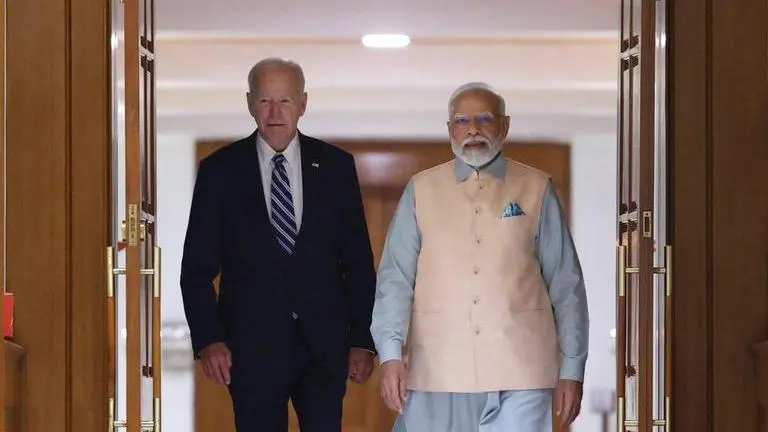Updated 9 September 2023 at 08:23 IST
G20 Summit: PM Modi, Biden cement ties over defence and tech in bilateral meet
Indian PM Modi and US President Biden enhance ties through defence procurement, space collaboration, and tech advancements.
- India News
- 4 min read

Indian Prime Minister Narendra Modi and US President Joe Biden, in a bid to reinforce the India-US relationship, met on September 8, a day before the G20 summit scheduled to take place on September 9-10. This rendezvous marked a continuation of the discussions on defence deals initiated during their previous meeting in June 2022.
Procurement of General Atomics MQ-9B Reapers
In one of the most notable outcomes of this meeting, President Biden received a Letter of Request (LoR) from India's Ministry of Defence regarding the procurement of 31 General Atomics MQ-9B remotely piloted aircraft (RPA). These acquisitions comprise 16 Sky Guardians (eight for the Army and eight for the Navy) and 15 Sea Guardians for the Indian Navy. The Indian Navy, which currently operates two unarmed versions of the MQ-9B Reaper and recently showcased them during an army drill, had initially leased these two drones from the US. The Navy has expressed an intent to extend this arrangement. The acquisition of the MQ-9B pair took place during the peak of the Galwan crisis.
According to the joint statement, the Medium-Range Long Endurance (MALE) drone will significantly enhance the intelligence, surveillance, and reconnaissance (ISR) capabilities of India's armed forces across multi-faceted domains. The Indian Ministry of Defence has estimated a cost of $3 billion for this procurement, as indicated in the Acceptance of Necessity (AoN). However, it is important to note that further negotiations are expected to refine this figure. As stated by the Indian MoD, "the US Government and MoD will finalise the Letter of Offer and Acceptance (LOA), in which details of equipment and terms of the procurement will be negotiated and finalised in accordance with the FMS program, considering the price and terms offered by the US Government and General Atomics to other countries."
Deepening cooperation in space
Beyond land, sea, and air: India and the United States are also set to deepen their cooperation in the realm of space. Both leaders affirmed their commitment to enhancing coordination on planetary defence, safeguarding our planet and space assets from potential threats posed by asteroids and near-Earth objects. The US has pledged its support for India's participation in asteroid detection and tracking via the Minor Planet Center. This was preceded by recognition of India's recent achievements in space exploration, including its historic lunar landing and the launch of the Aditya-L1 mission, in the joint statement.
Advertisement
Another master ship repair agreement
Another significant milestone is the conclusion of a second Master Ship Repair Agreement, a step in India's emergence as a hub for the maintenance and repair of forward-deployed U.S. Navy assets and other aircraft and vessels. This follows a similar agreement signed with L&T on July 11, 2023, marking a testament to the growing strategic partnership.
Advancements in jet engine technology
Furthermore, both leaders welcomed the progress made in the 'Congressional Notification' process regarding India's interest in the Transfer of Technology (ToT) for the General Electric F414 engine. However, the commercial agreement between GE Aerospace and Hindustan Aeronautical Limited (HAL) for the manufacture of GE F-414 jet engines in India is still in progress, with negotiations for co-production and technology transfer (ToT) ongoing. The GE F414 is a crucial component of India’s future jet program, from the Tejas MK2 program to the initial prototypes of India’s Fifth-generation aircraft currently referred to as the AMCA (Advanced Medium Combat Aircraft) by the ADA.
Advertisement
INDUS-X: Fostering defence collaboration
The India-U.S. Defence Acceleration Ecosystem (INDUS-X) also took centre stage during the meeting. In a very short span, it has played a major role in the formulation of a robust collaboration between the defence sectors of both nations. Initiatives such as the Academia Start-up Partnership at IIT Kanpur and the Joint Accelerator Program for Indian startups, with participation from Penn State University, highlight both nations’ growing commitment to innovation and entrepreneurship in defence technology.
Collaboration in Quantum domain
Moreover, the United States also reaffirmed its intent to collaborate in the quantum domain. This encompasses bilateral efforts as well as participation in the Quantum Entanglement Exchange, a platform aimed at facilitating international quantum exchange opportunities. The recognition of India's S.N. Bose National Centre for Basic Sciences, Kolkata, as a member of the Quantum Economic Development Consortium, and the partnership between the Indian Institute of Technology (IIT) Bombay and the Chicago Quantum Exchange, is representative of both nations moving forward with cutting-edge research and development.
Published By : Swapnanil Chatterjee
Published On: 9 September 2023 at 08:16 IST
